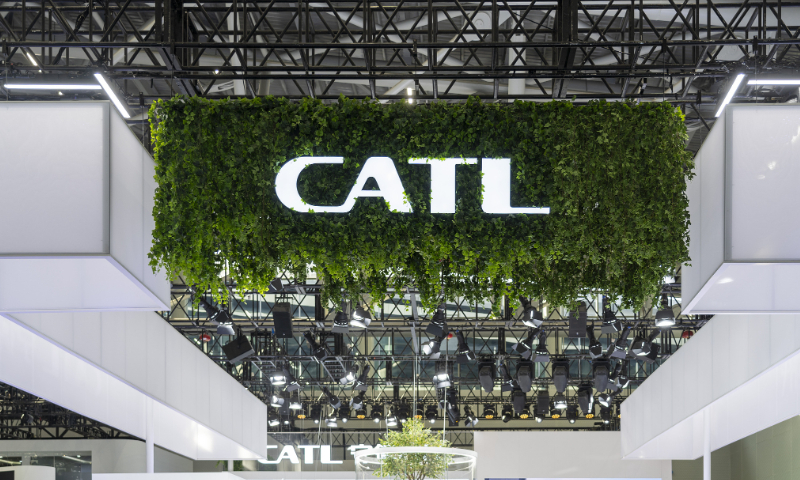
Photo: VCG
Chinese lithium-ion battery giant Contemporary Amperex Technology (CATL), together with Stellantis NV, a carmaker based in the Netherlands, announced on Tuesday the signing of a non-binding Memorandum of Understanding (MoU).
The deal mirrors the need for stronger cooperation between European carmakers and Chinese new energy firms, despite the growing protectionism in some EU countries in the field.
The agreement means that CATL will supply lithium iron phosphate (LFP) battery cells and modules to power the Dutch company's electric vehicle production in Europe, another milestone for the Chinese new energy vehicle (NEV) battery maker to access the wider European market.
The MoU outlined a long-term collaboration between CATL and Stellantis on two strategic fronts: building a technology roadmap to support Stellantis' cutting-edge electric vehicles and identifying opportunities to further strengthen the battery value chain, according to CATL's statement.
Commenting on the significance of the MoU, Carlos Tavares, CEO of Stellantis, said the deal "is another ingredient in our long-term strategy to protect freedom of mobility for the European middle class."
"CATL is the industry leader in this sector and together with our iconic vehicle brands, we will bring innovative and accessible battery technology to our customers while helping us achieve our carbon net zero ambition by 2038," Tavares said.
Chairman and General Manager of CATL Robin Zeng said the deal would take the two companies to "a new level."
"We will remain dedicated to delivering more competitive and sustainable solutions for our partners to promote the global energy transition," Zeng said.
Featuring a long service life and high thermal stability, LFP technology can enable Stellantis to offer high-quality, durable, and affordable electric vehicles, according to CATL.
Chinese companies' leading position in the NEV supply chain has been notable, becoming an important driver for the global new energy transformation.
China's NEV sales and growth rate have ranked first in the world for eight consecutive years, with a global market share of more than 60 percent, and it is becoming one of the leaders in the global new energy field, industry data shows.
In the context of the booming Chinese NEV industry, international car makers are seeking closer cooperation with Chinese industry insiders through investment and acquisition.
On October 26, Stellantis NV announced plans to invest 1.5 billion euros ($1.58 billion) to acquire approximately 20 percent of Chinese electric vehicle start-up Leapmotor, joining several other European automakers in strengthening cooperation with Chinese EV makers this year.
Germany's Volkswagen Group invested around $700 million in Chinese electric carmaker Xpeng Motors for about 4.99 percent of its shares, the two companies announced on July 26. The move is an effort to strengthen the German carmaker's position in the Chinese automotive market.
"European companies' high-profile investment in China's EV industry reflects their recognition of China's smart EV technologies and opportunities brought by the huge market. Increased cooperation with China will also accelerate the EU's green transition," Cui Dongshu, secretary general of the China Passenger Car Association, said in a previous interview with the Global Times in October.
Global Times
